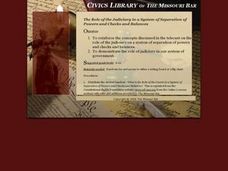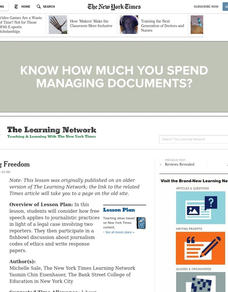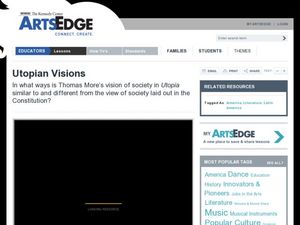ProCon
Gun Control
According to some estimates, there are more guns than people in the United States. Learners decide if America should enact more gun control laws. They analyze information about gun deaths in the United States by year, read about the...
Curated OER
Bill of Rights
US history classes explore constitutional rights as they relate to court cases involving teens. Your class must already be familiar with the Bill of Rights before beginning this series of exercises. In preparation for a debate-style...
Pacific University Oregon
Civil Rights: US History
To gain an understanding of the Civil Rights Movement of the 1960s, class members investigate the Jim Crow Laws, the Emancipation Proclamation, the 13th, 14th, and 15th Amendments of the US Constitution, and the 1898 Supreme Court case,...
Annenberg Foundation
Controversial Issues in Practice
Wow! This resource provides three related lessons on the First Amendment that challenge US government students to explore their personal opinion on the separation of church and state. Each lesson can be adjusted in length, but is...
Constitutional Rights Foundation
Guest-Worker Program
The U.S. Guest-Worker Program and the H-2A visa are the focus of a social studies activity. First, class members assume the role of advisors who must present the president with four proposals that would amend the visas given to...
Southern Poverty Law Center
Teaching Hard History: A Framework for Teaching American Slavery
Pupils investigate American slavery from colonial times through the Civil War. They incorporate primary sources, video clips, and firsthand accounts to understand how the slavery issue gripped the nation. Essays, presentations, and...
NPR
Same-Sex Marriage
The battle over same-sex marriage is a prevalent issue in the United States, and a valuable topic to be discussed in your social studies classroom. Here is a basic outline of introductory questions, focus questions, vocabulary, and media...
Curated OER
Lobbying for Passage of the National Suffrage Amendment
Students examine the lobbying involved in trying to pass the Nineteenth Amendment. They discover the relationships between women and the suffragists. They also examine the media's coverage of the event.
Curated OER
Nineteenth Ammendment
Learners discuss the Nineteenth Amendment and how it gave women the power to vote. They emphasize the struggle women had in gaining the right to vote and some important questions are answered.
Curated OER
Houses or Walaloos
Investigate the legal history and application of the Fifth Amendment. Write an essay in favor of a person keeping land that has been in his/her family for decades.
Curated OER
Government: Missouri Bar Civics Library
Students visit the Missouri bar Website to examine information about the U.S. Constitution and its Amendments. They complete a variety of activities from the provided lessons including the judiciary, Fourth Amendment issues, civil law,...
Curated OER
Powerful Signatures
Students experience famous historical documents that were initiated and propelled by signatures such as Declaration of Independence, U.S. Constitution. They create a school amendment using the information gathered.
Curated OER
Declaration of Independence
Students explore the US Constitution. In this Bill of Rights lesson, students work in pairs to select and examine amendments to the Bill of Rights. Students will identify what the amendment means, why they chose it, what it protects, and...
Curated OER
The Volstead Act and Related Prohibition Documents
Students listen to the 18th Amendment. After a discussion on Prohibition, the groups determine if it was a success or a failure and present their findings to the class. They view political cartoons of the day and analyze their meaning.
Curated OER
Fugitive from Labor Cases: Henry Garnett (1850) and Moses Honner (1860)
Students engage in the comparison of cases which demonstrate the increasingly volatile political crisis in the 1850s arising over the issue of slavery and the necessity for the enactment of the 13th, 14th, and 15th Amendments to the U.S....
Curated OER
The My Lai Courts Martial of 1970
Learners research the My Lai Massacre and trial. Students discuss the events and the trial, reviewing the constitutional amendments and concerns related to the massacre. Learners write an analysis of photographs related to the incident.
Curated OER
Citizens Together
Students examine the bill of rights as it relates to founding documents and their significance today. In this bill of rights lesson plan, students use newspapers as sources to answer critical questions regarding democratic citizenship....
Curated OER
Across The Centuries
Students analyze the American Bill of Rights, compare it to the English Bill of Rights and note the differences in an essay. They access websites imbedded in this plan to do their research, then present their findings to the class.
Curated OER
Whose God?
Students investigate religious freedom in the U.S. They watch and discuss a Bill Moyers NOW video, take a Freedom of Religion quiz, write an essay, and participate in a mock trial and debate.
Curated OER
Bill of Rights - Remember Me!
Students participate in a unique and exciting method of memorizing the Bill of Rights using locations throughout the classroom and visual and auditory cues. They take a quiz they are guaranteed to pass!
Curated OER
Press-ing Freedom
Students consider how free speech applies to journalistic practices in light of a legal case involving two reporters. They participate in a fishbowl discussion about journalism codes of ethics and write response papers.
Curated OER
Creating A Bill Of Rights In Space
Students define rights, analyze and apply the U.S. Bill of Rights to hypothetical situations, and create an Intergalactic Bill of Rights.
Curated OER
Essentials of the US Constitution
Learners determine how the content of the U.S. Government enables the U.S. Government to function. They examine the roles and functions of the three branches of government and how the separation of powers and checks and balances affect...
Curated OER
Utopian Visions
Students examine Sir Thomas More's Utopian vision. In this philosophy lesson, students read Utopia and determine the pros and cons of Utopian societies. Students then create and present monologues of residents of the Utopia.

























